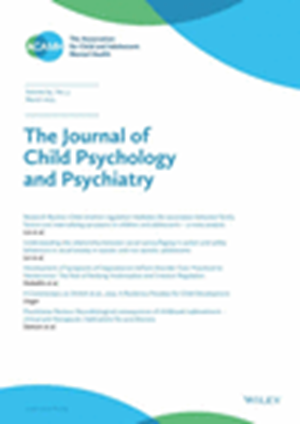基于多模态方法的执行功能预测自闭症幼儿园儿童的学术和社交技能
IF 7
1区 医学
Q1 PSYCHIATRY
引用次数: 0
摘要
执行功能(EF)是一种认知过程,是目标导向能力和行为的基础,在自闭症儿童中被发现是可变的。虽然ef是神经正常儿童学业和社会结果的良好预测因素,但尚不清楚这些关联是否适用于自闭症谱系障碍(ASD)儿童。本研究采用多测量方法,考察了认知能力强、语言能力强的幼儿园自闭症儿童EF与学业和社交技能之间的关系。方法对67名4 ~ 6岁的自闭症儿童进行从入园到出园的纵向跟踪。采用计算机化EF量表、行为观察和家长报告的多模式评估方法对儿童EF进行测量。学业成绩和社交能力分别通过标准化评估和家长报告进行评估。在控制关键人口因素(如年龄、性别、非语言智商)的情况下,采用多元回归模型探讨英语与学业和社会结果的关系。结果在控制年龄、性别和非语言智商的情况下,通过计算机化电池测量的f与数学成绩显著相关,同时也与纵向相关。家长报告的EF困难与当前和后来的家长报告的同伴游戏挑战密切相关。结论:这些发现表明,EF可能是自闭症儿童在转学阶段取得学业成功的关键基础技能。因此,有针对性的EF干预可能是优化自闭症幼儿园儿童学业和社会发展的有力途径。该结果还强调了多测量方法对EF评估的重要性,因为它提供了对EF对ASD关键发育结果的更广泛影响的更全面的理解。本文章由计算机程序翻译,如有差异,请以英文原文为准。
Executive function predicts academic and social skills in autistic kindergartners based on a multimodal approach
BackgroundExecutive functions (EF) are cognitive processes that underlie goal‐directed abilities and behaviors which have been found to be variable in autistic children. While EFs are well‐established predictors of academic and social outcomes in neurotypical children, it is unclear if these same associations are true for children with autism spectrum disorder (ASD). This study examined the relation between EF and academic and social skills in cognitively able, verbal kindergarteners with ASD, while using a multimeasurement approach to EF skills.MethodsParticipants included 67 autistic children aged 4–6 years longitudinally followed from kindergarten entry to exit. Children's EF was measured using a multimodal assessment approach with a computerized EF battery, behavioral observation, and parent report. Academic achievement and social skills were evaluated through a standardized assessment and parent report, respectively. Multiple regression models were conducted to explore the associations of EF with academic and social outcomes, while controlling for key demographic factors (e.g. age, sex, nonverbal IQ).ResultsEF, measured through the computerized battery, was significantly associated with math achievement when controlling for age, sex, and nonverbal IQ, both concurrently and longitudinally. EF difficulties, as reported by parents, were closely linked to current and later parent‐reported peer play challenges.ConclusionsThese findings indicate that EF may be critical foundational skills for school success in young autistic children at school transition. Therefore, targeted EF interventions could be a powerful way to optimize academic and social development in autistic kindergarteners. The results also highlight the importance of a multimeasurement approach to EF assessment, as it provides a more comprehensive understanding of the broader impact of EF on key developmental outcomes in ASD.
求助全文
通过发布文献求助,成功后即可免费获取论文全文。
去求助
来源期刊
CiteScore
13.80
自引率
5.30%
发文量
169
审稿时长
1 months
期刊介绍:
The Journal of Child Psychology and Psychiatry (JCPP) is a highly regarded international publication that focuses on the fields of child and adolescent psychology and psychiatry. It is recognized for publishing top-tier, clinically relevant research across various disciplines related to these areas. JCPP has a broad global readership and covers a diverse range of topics, including:
Epidemiology: Studies on the prevalence and distribution of mental health issues in children and adolescents.
Diagnosis: Research on the identification and classification of childhood disorders.
Treatments: Psychotherapeutic and psychopharmacological interventions for child and adolescent mental health.
Behavior and Cognition: Studies on the behavioral and cognitive aspects of childhood disorders.
Neuroscience and Neurobiology: Research on the neural and biological underpinnings of child mental health.
Genetics: Genetic factors contributing to the development of childhood disorders.
JCPP serves as a platform for integrating empirical research, clinical studies, and high-quality reviews from diverse perspectives, theoretical viewpoints, and disciplines. This interdisciplinary approach is a key feature of the journal, as it fosters a comprehensive understanding of child and adolescent mental health.
The Journal of Child Psychology and Psychiatry is published 12 times a year and is affiliated with the Association for Child and Adolescent Mental Health (ACAMH), which supports the journal's mission to advance knowledge and practice in the field of child and adolescent mental health.

 求助内容:
求助内容: 应助结果提醒方式:
应助结果提醒方式:


